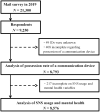Who is mentally healthy? Mental health profiles of Japanese social networking service users with a focus on LINE, Facebook, Twitter, and Instagram
- PMID: 33657132
- PMCID: PMC7928453
- DOI: 10.1371/journal.pone.0246090
Who is mentally healthy? Mental health profiles of Japanese social networking service users with a focus on LINE, Facebook, Twitter, and Instagram
Abstract
Background: Both negative and positive associations between social networking service (SNS) usage and mental health have been suggested by previous studies; however, their differences by type of SNS and age remain unclear. We addressed this issue based on the frequency of traditional communication such as face-to-face and non-face-to-face communication (e.g., phone, email, and letters).
Methods: In total, 8,576 individuals participated, including 2,543 aged 18-39, 3,048 aged 40-64, and 2,985 aged over 65 years. They were asked to indicate their frequency of SNS usage, both for posting and checking, of LINE (a popular message application in Japan), Facebook, Twitter, and Instagram, with frequent usage defined as posting or checking more than a few times a week. To determine mental health status, WHO-5 (i.e., well-being), K6 (i.e., distress symptoms), and feelings of loneliness were assessed. Multiple and logistic regression analyses were adjusted for the frequency of traditional communication. To avoid type 1 error, a Bonferroni correction of p ≤ 0.002 was applied in the regression models (p = 0.05/18, a number of regression models).
Results: The most frequently used SNS across the three age groups was LINE; frequent usage (both posting and checking) among older adults was independently associated with better well-being. Frequent posting on Facebook was associated with better well-being in middle-aged adults. Young adults who frequently checked on Instagram showed a tendency toward better well-being and lower distress symptoms. On the contrary, frequent usage of Twitter was associated with distress symptoms or feelings of loneliness across all three age groups.
Conclusions: We found generational and SNS-type-dependent negative and positive associations between SNS use and mental health, indicating the possible influences of SNS use and the importance of non-SNS communication.
Conflict of interest statement
The authors have declared that no competing interests exist.
Figures



Similar articles
-
Instagram Use, Loneliness, and Social Comparison Orientation: Interact and Browse on Social Media, But Don't Compare.Cyberpsychol Behav Soc Netw. 2016 Dec;19(12):703-708. doi: 10.1089/cyber.2016.0201. Epub 2016 Nov 17. Cyberpsychol Behav Soc Netw. 2016. PMID: 27855266
-
Taking a break: The effect of taking a vacation from Facebook and Instagram on subjective well-being.PLoS One. 2019 Jun 6;14(6):e0217743. doi: 10.1371/journal.pone.0217743. eCollection 2019. PLoS One. 2019. PMID: 31170206 Free PMC article.
-
Investigating the effect of social networking site use on mental health in an 18-34 year-old general population; a cross-sectional study using the 2016 Scania Public Health Survey.BMC Public Health. 2020 Nov 23;20(1):1753. doi: 10.1186/s12889-020-09732-z. BMC Public Health. 2020. PMID: 33225935 Free PMC article.
-
Is social network site usage related to depression? A meta-analysis of Facebook-depression relations.J Affect Disord. 2019 Apr 1;248:65-72. doi: 10.1016/j.jad.2019.01.026. Epub 2019 Jan 27. J Affect Disord. 2019. PMID: 30711871 Review.
-
The Use of Social Networking Sites in Mental Health Interventions for Young People: Systematic Review.J Med Internet Res. 2018 Dec 18;20(12):e12244. doi: 10.2196/12244. J Med Internet Res. 2018. PMID: 30563811 Free PMC article.
Cited by
-
The Association Between COVID-19 Information Sources and Stigma Against Health Care Workers Among College Students: Cross-sectional, Observational Study.JMIR Form Res. 2022 Jul 7;6(7):e35806. doi: 10.2196/35806. JMIR Form Res. 2022. PMID: 35797105 Free PMC article.
-
Association between Internet Use and Locomotive Syndrome, Frailty, and Sarcopenia among Community-Dwelling Older Japanese Adults.Nurs Rep. 2024 May 31;14(2):1402-1413. doi: 10.3390/nursrep14020105. Nurs Rep. 2024. PMID: 38921715 Free PMC article.
-
An Overview of Social Participation in Older Adults: Concepts and Assessments.Phys Ther Res. 2021 Jul 13;24(2):85-97. doi: 10.1298/ptr.R0013. eCollection 2021. Phys Ther Res. 2021. PMID: 34532203 Free PMC article. Review.
-
Three years of COVID-19-related school restrictions and mental health of children and adolescents in Japan.Sci Rep. 2024 Jul 19;14(1):16707. doi: 10.1038/s41598-024-67138-y. Sci Rep. 2024. PMID: 39030262 Free PMC article.
-
Influence of "Face-to-Face Contact" and "Non-Face-to-Face Contact" on the Subsequent Decline in Self-Rated Health and Mental Health Status of Young, Middle-Aged, and Older Japanese Adults: A Two-Year Prospective Study.Int J Environ Res Public Health. 2022 Feb 16;19(4):2218. doi: 10.3390/ijerph19042218. Int J Environ Res Public Health. 2022. PMID: 35206406 Free PMC article.
References
-
- Hanson BS, Isacsson SO, Janzon L, Lindell SE. Social network and social support influence mortality in elderly men. The prospective population study of "Men born in 1914," Malmo, Sweden. American journal of epidemiology. 1989;130(1):100–11. Epub 1989/07/01. 10.1093/oxfordjournals.aje.a115301 . - DOI - PubMed
-
- Ellison NB, Steinfield C, Lampe C. The Benefits of Facebook “Friends:” Social Capital and College Students’ Use of Online Social Network Sites. Journal of Computer-Mediated Communication. 2007;12(4):1143–68. 10.1111/j.1083-6101.2007.00367.x - DOI
Publication types
MeSH terms
LinkOut - more resources
Full Text Sources
Other Literature Sources
Medical

